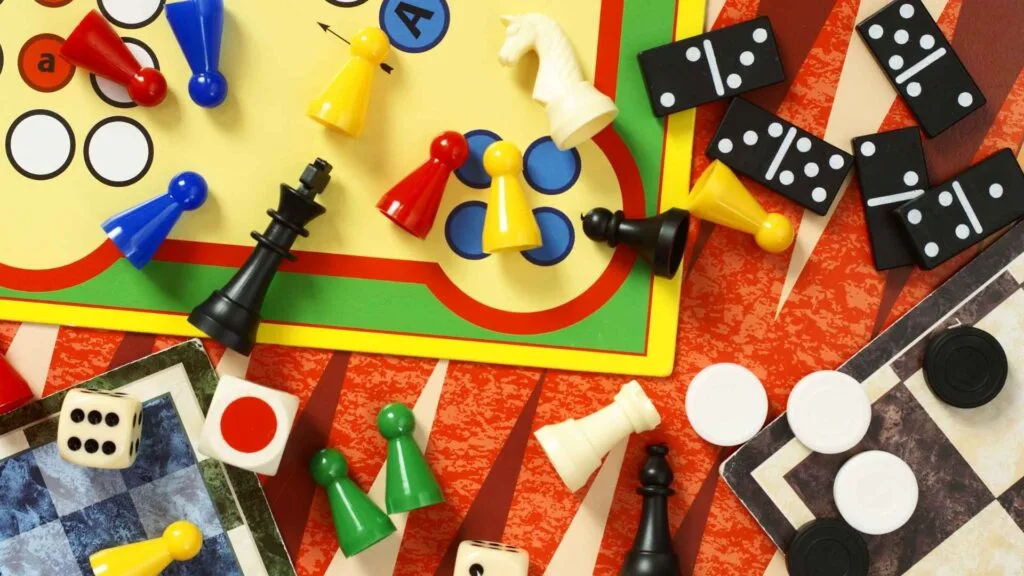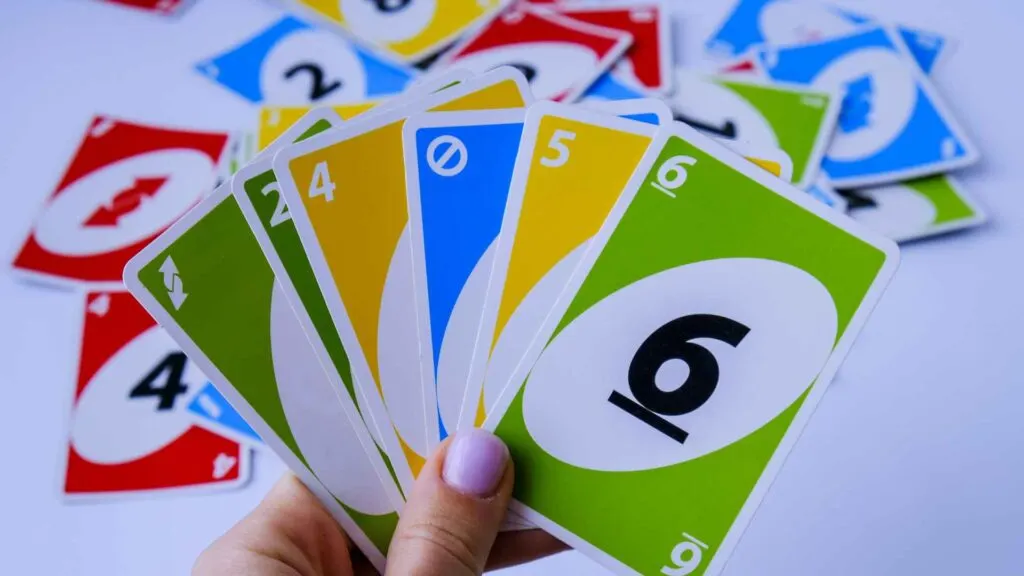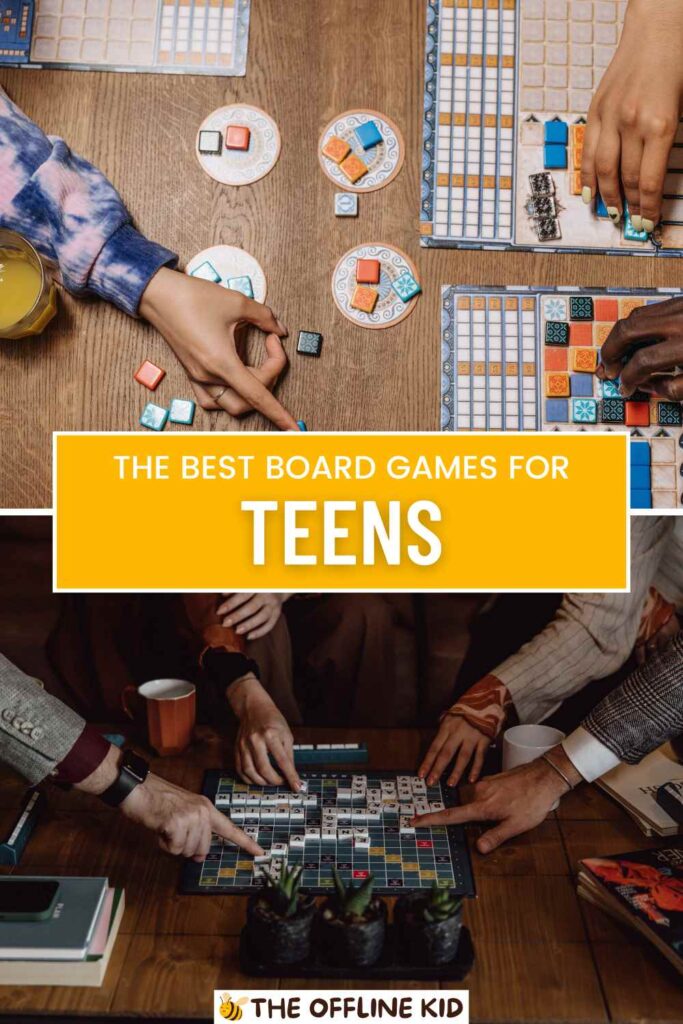Board games are more than just fun—they’re tools for learning, socializing, and strategic thinking.
Discover the top board games that teens will love, covering classics, strategy games, cooperative play, and more!
Classic Board Games
Board games have a timeless appeal, offering teens a chance to engage in strategic thinking, social interaction, and friendly competition.
Here’s a look at some of the classic board games that continue to captivate teens:
Chess
Chess is a game of intellect and strategy, played on a checkered board with 64 squares.
It’s a two-player game where each player commands an army of pieces, aiming to checkmate the opponent’s king. Here’s why it’s great for teens:
- Develops Strategic Thinking: Chess requires foresight, planning, and adaptability.
- Enhances Problem-Solving Skills: Players must anticipate moves and counter their opponent’s strategies.
- Encourages Patience and Focus: Learning to think several steps ahead teaches patience and concentration.
Scrabble
Scrabble is a word game where players use letter tiles to create words on a game board. Points are scored based on the complexity and length of the words formed.
Key aspects that make Scrabble ideal for teens include:
- Builds Vocabulary: Players learn new words and improve their spelling abilities.
- Promotes Critical Thinking: Strategic placement of tiles and planning ahead are crucial.
- Fosters Healthy Competition: Encourages friendly competition while boosting language skills.
Monopoly
Monopoly is a classic real estate trading game where players buy, sell, and develop properties to accumulate wealth and bankrupt opponents.
It’s known for its competitive nature and economic principles:
- Teaches Financial Literacy: Players manage money, negotiate deals, and make strategic investments.
- Enhances Decision-Making Skills: Choosing between properties and investments involves risk assessment.
- Encourages Social Interaction: Negotiation and deal-making foster social skills and teamwork.
Risk
Risk is a global domination game where players use armies to conquer territories and continents.
It involves strategic planning, alliances, and calculated risk-taking:
- Develops Strategic Planning: Players must balance offense and defense to expand their empire.
- Promotes Diplomacy: Forming alliances and negotiating with other players is essential.
- Encourages Geopolitical Awareness: Understanding geography and global dynamics adds depth to gameplay.
These classic board games provide teens with a mix of intellectual challenge, social interaction, and skill development, making them timeless favorites for game nights and gatherings.

Strategy and Euro Games
Strategy and Euro-style board games offer teens an opportunity to delve deeper into complex gameplay mechanics, strategic planning, and immersive thematic experiences.
Here are some standout games in this category:
Catan
Settlers of Catan, or simply Catan, is a resource management game where players collect and trade resources to build settlements and roads on the island of Catan. It’s renowned for its blend of strategy and negotiation:
- Resource Management: Collecting and trading resources like wood, brick, and wheat is crucial for expansion.
- Negotiation and Trading: Players negotiate trades and form alliances to gain advantages.
- Strategic Planning: Deciding where to build settlements and roads requires long-term planning and adaptability.
Ticket to Ride
Ticket to Ride is a railway-themed board game where players compete to build train routes across North America (or other regions in variant versions). Key features include:
- Geographical Knowledge: Learning geography as players build routes between cities.
- Set Collection: Gathering sets of colored train cards to claim routes and complete destination tickets.
- Strategic Decision-Making: Choosing between short and long routes to maximize points and block opponents.
Splendor
Splendor is a game of chip-collecting and card development, where players take on the role of Renaissance merchants acquiring gem mines, transportation, and shops:
- Engine-Building: Acquiring cards that provide permanent gem bonuses to purchase more valuable cards.
- Tactical Choices: Deciding when to reserve cards, purchase developments, or collect gems is critical.
- Simple Rules, Deep Strategy: Easy-to-learn mechanics with layers of strategic depth for repeated plays.
7 Wonders
7 Wonders is a card-drafting game where players compete to build one of the seven wonders of the ancient world. It’s known for its:
- Simultaneous Gameplay: All players make their moves simultaneously, keeping the game fast-paced.
- Civilization Building: Developing military strength, cultural achievements, and economic prowess.
- Strategic Depth: Balancing resources, wonders’ benefits, and neighbor interactions adds complexity.
These strategy and Euro-style board games challenge teens to think critically, plan strategically, and adapt to changing game dynamics. They offer immersive experiences that reward tactical decision-making and interaction with friends and family.

Cooperative and Team-Based Games
Cooperative and team-based board games foster collaboration, communication, and shared decision-making among teens.
These games emphasize working together towards common goals while facing challenges and obstacles. Here are some top picks in this category:
Pandemic
Pandemic is a cooperative game where players work together as members of a disease control team to prevent global outbreaks of deadly diseases. Key aspects include:
- Teamwork: Players must collaborate to plan and execute strategies to contain diseases.
- Strategic Planning: Prioritizing actions like treating infections, researching cures, and preventing outbreaks.
- Intense Decision-Making: Every move affects the global situation, requiring quick thinking and adaptation.
Codenames
Codenames is a word association game where players work in teams to identify their team’s secret agents based on word clues provided by a spymaster:
- Word Association: Finding connections between words and clues to uncover agents.
- Team Dynamics: Effective communication and understanding teammates’ thought processes.
- Intellectual Challenge: Balancing risk and reward in choosing clues and making guesses.
Forbidden Island/Forbidden Desert
Forbidden Island and Forbidden Desert are cooperative adventure games where players must work together to explore, gather resources, and escape dangerous environments:
- Coordinated Effort: Players must strategize and coordinate actions to survive and achieve objectives.
- Dynamic Challenges: Facing changing landscapes, shifting sands, or rising waters adds tension and urgency.
- Role Specialization: Each player may have unique abilities crucial for the team’s success.
These cooperative and team-based board games promote teamwork, communication, and critical thinking skills among teens. They provide an immersive and engaging experience where players learn to collaborate effectively while enjoying thrilling adventures and strategic challenges.
Party and Social Games
Party and social board games are perfect for teens looking to have fun and create memorable moments with friends and family.
These games often emphasize creativity, laughter, and interactive gameplay. Here are some standout choices in this category:
Telestrations
Telestrations is a hilarious drawing and guessing game where players sketch and guess what others have drawn. Key features include:
- Drawing and Guessing: Players create sketches based on a word or phrase, then pass it on for interpretation.
- Humor and Creativity: Seeing how interpretations evolve from drawing to guessing often leads to laughter.
- Ease of Play: Simple rules make it accessible for players of all skill levels, encouraging creativity and spontaneity.
Werewolf
Werewolf is a social deduction game where players take on roles like villagers or werewolves, trying to identify their enemies while protecting their own:
- Hidden Roles: Players are assigned secret roles and must deduce others’ roles through discussion and observation.
- Bluffing and Deception: Werewolves must conceal their identity while villagers seek to uncover them.
- Dynamic Gameplay: Each round brings new strategies and alliances, making each game unique and engaging.
Codenames: Pictures
Codenames: Pictures is a visual interpretation game where players use abstract images to convey clues and guess the correct words or phrases:
- Visual Communication: Interpreting abstract images to convey clues adds a creative twist to gameplay.
- Team Strategy: Collaborating with teammates to decipher clues and avoid pitfalls.
- Quick Thinking: Racing against the clock to connect clues and uncover hidden meanings keeps players engaged.
These party and social board games are designed to entertain and engage teens in interactive and laughter-filled experiences. They encourage creativity, communication, and quick thinking while fostering memorable moments with friends and family.

Unique and Specialty Games
Unique and specialty board games offer teens a chance to explore different themes, mechanics, and immersive experiences beyond traditional genres.
These games often feature innovative gameplay and thematic storytelling. Here are some standout options:
Betrayal at House on the Hill
Betrayal at House on the Hill is a horror-themed exploration and betrayal game where players explore a haunted mansion, encountering mysteries and dangers before one player turns traitor:
- Exploration and Storytelling: Discovering new rooms and unfolding the narrative creates suspense and immersion.
- Variable Endings: Each game session leads to a different scenario, adding replayability and surprise twists.
- Theme Integration: Atmospheric components and thematic artwork enhance the eerie atmosphere of the game.
Sushi Go!
Sushi Go! is a fast-paced card-drafting game where players draft sushi dishes to create the most appealing meal:
- Simple Gameplay: Easy-to-learn rules make it accessible for all skill levels, perfect for quick play sessions.
- Strategic Depth: Choosing which cards to draft and aiming for the most points requires strategic decision-making.
- Cute and Engaging Theme: Colorful artwork and sushi-themed cards add charm and enjoyment to the game.
King of Tokyo
King of Tokyo is a dice-rolling game where players control giant monsters battling for dominance over Tokyo:
- Dice Rolling and Combat: Rolling dice to attack opponents, heal, or gain energy adds excitement and unpredictability.
- Player Interaction: Choosing when to enter Tokyo and when to retreat involves strategic risk assessment and timing.
- Thematic Immersion: Engaging artwork and monster abilities enhance the thematic experience of monster battles.
These unique and specialty board games offer teens opportunities to explore diverse themes, innovative mechanics, and immersive storytelling. They provide engaging gameplay experiences that encourage creativity, strategic thinking, and interaction with friends.
Role-Playing and Adventure Games
Role-playing and adventure board games offer teens immersive storytelling, character development, and cooperative play experiences.
These games often involve quests, exploration, and strategic decision-making. Here are some top picks in this category:
Dungeons & Dragons (D&D)
Dungeons & Dragons is a classic tabletop role-playing game where players create characters, embark on adventures, and engage in collaborative storytelling:
- Character Creation: Designing characters with unique abilities, backgrounds, and personalities.
- Narrative and Exploration: Players explore dungeons, solve puzzles, and interact with NPCs (non-player characters).
- Cooperative Gameplay: Working together to overcome challenges, defeat monsters, and achieve quest objectives.
Gloomhaven
Gloomhaven is a legacy-style cooperative board game where players take on the roles of mercenaries in a persistent world of shifting motives and dynamic scenarios:
- Campaign and Legacy Elements: Progressing through a series of linked scenarios with evolving storylines.
- Tactical Combat: Strategic positioning, skill management, and adapting to enemies’ actions.
- Character Progression: Upgrading abilities, gaining new powers, and exploring personal quests.
Tips for Choosing Board Games for Teens
Choosing the right board games for teens involves considering factors like complexity, theme, player count, and personal preferences.
Here are some tips to help you select games that will appeal to teens and provide enjoyable gaming experiences:
Complexity and Learning Curve
- Start with Familiar Themes: Introduce games with themes that resonate with teens, such as fantasy, sci-fi, or mystery.
- Consider Game Complexity: Balance between games that are easy to learn for newcomers and those that offer deeper strategic gameplay for seasoned players.
Player Count and Group Dynamics
- Group Size Matters: Choose games that accommodate the typical number of players in your group, whether it’s small gatherings or larger parties.
- Team vs. Individual Play: Decide if teens prefer cooperative gameplay, competitive matchups, or a mix of both.
Theme and Interest
- Personalize Game Selection: Match games to teens’ interests, whether they enjoy strategy, storytelling, humor, or specific genres like horror or adventure.
- Explore Diverse Themes: Offer variety in themes to cater to different preferences and keep gaming sessions engaging.
Replayability and Longevity
- Value Replayability: Opt for games with varied setups, multiple paths to victory, or expansion options to extend gameplay longevity.
- Legacy and Campaign Games: Consider games with ongoing storylines or evolving gameplay mechanics for deeper immersion over multiple sessions.
Reviews and Recommendations
- Research Before Buying: Read reviews, watch gameplay videos, and seek recommendations from trusted sources or gaming communities.
- Try Before You Buy: If possible, test games through demos, rentals, or borrowing from friends to ensure they match teens’ gaming preferences.
Accessibility and Enjoyment
- Accessible Rules: Prioritize games with clear rules and intuitive gameplay mechanics to minimize learning curves and maximize enjoyment.
- Encourage Experimentation: Allow teens to explore new genres and game types to discover their personal favorites and expand their gaming horizons.
Choosing board games for teens involves understanding their interests, preferences, and gaming styles. By considering these factors and tips, you can select games that foster creativity, social interaction, and memorable experiences for teens during game nights and gatherings.
Conclusion
Board games offer teens more than just entertainment—they provide opportunities for learning, social interaction, and skill development.
Whether they’re playing classics like Chess and Monopoly or exploring immersive worlds in games like Dungeons & Dragons and Gloomhaven, teens engage in strategic thinking, teamwork, and creative problem-solving.
By choosing board games that match their interests and preferences, teens can enjoy memorable experiences with friends and family.
From cooperative adventures to competitive challenges, board games foster camaraderie and fun-filled moments that transcend screens and bring people together.
Embrace the world of board gaming with teens and discover how these timeless games continue to enrich lives, spark imaginations, and create lasting bonds. Encourage teens to explore new games, share laughter, and embrace the thrill of tabletop adventures.


